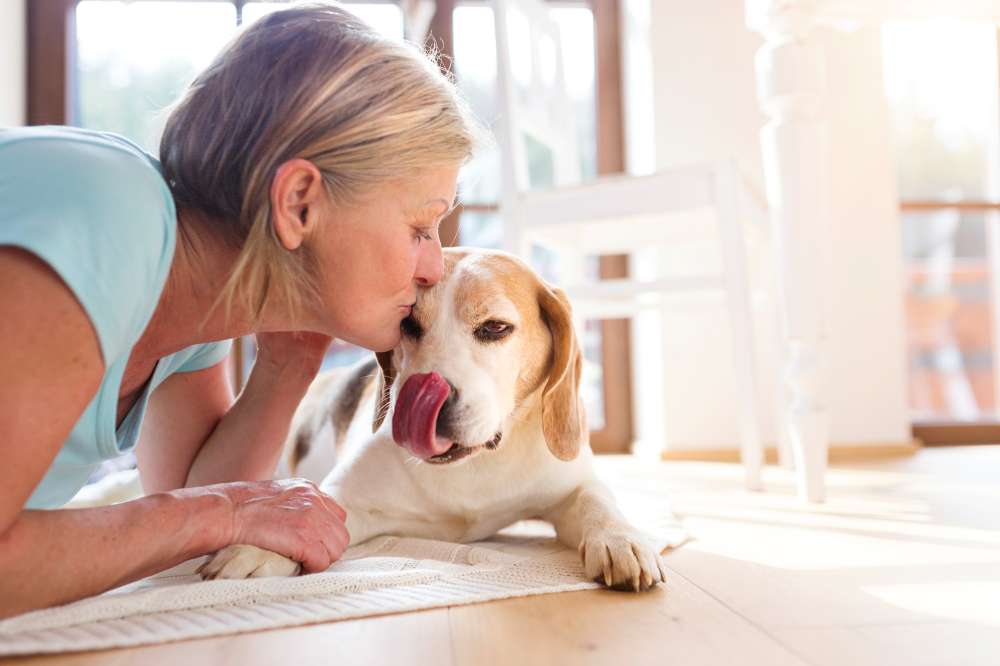
This article was updated on April 11th, 2022
Losing a pet is not easy. In my life, I have lost three great pets. They lived well beyond their life’s expectations. That did not make me deal with it any easier. The space they left was real.
The death of a loved one is one of the biggest challenges that we face as humans, heading the list of stressful life events compiled by psychiatrist researchers Thomas H. Holmes (1).
It’s not uncommon for pet owners to even report that the death of a loved dog or other pet can prove even more painful, in some cases, than the loss of a family member. In this article, we will review the best ways to grieve the loss of a pet after euthanasia.
What makes euthanizing such a complicated way to lose a dog?
It’s never easy to grieve the loss of a dog, but when euthanasia is involved, it’s especially difficult. There are some clear reasons why:
- Guilt: Grieving the loss of a pet will be different depending upon the individual and how and when the pet died. If it was an accident or illness and whether the accident or illness was preventable is key. Guilt is the best playmate of grief.
- Feelings of selfishness: Caring for an ailing pet who may have lost use of limbs or bodily functioning is time consuming and exhausting. It is normal to feel guilt. However, it is important to recognize that just as you are exhausted from caring for an ill pet, the pet is exhausted from the pain and discomfort. It is important to factor in the quality of that pet’s life when making the decision to euthanize your pet. As the illness prolongs, your dog’s quality of life may only get worse.
- Feeling like you waited too long: Sometimes, we as pet lovers will hold on too long that our best friend will get better. It is often difficult to accept that he will not. When the time comes it is not productive to feel guilt over having waited too long. You gave yourself more time, you gave him more time.
- Worrying that your dog had more years left: Having looked three great pets in the eyes as they were euthanized, this is the most agonizing experience. The paw on the leg, the nuzzle of a head: all of those things can rip your heart out. However, we have to compartmentalize these moments, hold the dear yes, but recognize that we have made the decision for a reason; to do what is best for your pet.
- Doubt: One thing to feel encouraged over. Most vets are hesitant to euthanize, and many will only do so if there is no hope of recovery, or at least a significant improvement. Listen to your vet. He or she is your best guide.

11 Important Tips to Help You Grieve the Loss of Your Dog After Euthanasia
Grieving the loss of a pet can be very difficult. Below are steps you can take to cope with the pain and help grieve the loss of your dog:
- Understand that you did everything you could to care for your pet. We spend more time with our pets than we do with most humans. We feed them, we provide hydration, walks, and great tummy rubs. We take them to their vet checkups and make sure they have all their vaccines. However, we can’t prevent an illness or an accident. It is important to remember all the care you provided for your pet to ensure that they had a happy and healthy life.
- Remember that you gave your dog a very good life. Your dog had a comfortable home, delicious food, fun playtime, and most importantly love and safety.
- Cherish your memories: You can remember your friendly companion by placing framed pictures in your favorite rooms. Many online stores offer easy ways to add framed pictures to your home with just a few clicks.
- Talk to someone who can relate: Join a local group or an online Facebook support group for pet lovers who have lost their pets. Support groups can be of great help as you will be able to connect and share your experiences with people who can understand how you feel. If you regularly walk your dog in the neighborhood, your neighbors will know that walking is now going to be lonely for you. Ask them if you can join them as they walk with their pet.
- Save your pet’s collar or favorite toy. I kept my pet Dobbie’s collar for several years. It still smelled like her – not a pleasant smell, I might add, but it made me feel better.
- Be grateful that they shared their lives with you: Pets often give unconditional love. If they sleep in your bed you have loved on them and provided them a soft space and a heartbeat to comfort them at night. They have greeted you at the door and reminded you when it is dinner time. Pets are loyal and the love your pet gave to you is like no other.
- Never apologize for the grief you feel. Let it flow, then let it go. It has been 18 years since my Dobbie died. I still feel a wave of grief when I remember that sad day. I allow myself to feel it. I am glad I can feel it. When it was fresh, I could not go for a day without crying.
- Have your pet cremated or bury in the yard, a pet cemetery, or store in the home. The crematorium who took care of my cat, Gabe also provided a lock of his hair. His urn sits on my mantle along with that lock of hair. Sometimes I go and rub my fingers across the urn and say, “I miss you old man.”
- Talk with a trusted friend or family member. However, be mindful that not all people will understand how the loss of a pet can affect the owner. Unfortunately, not everyone knows the joys of loving a pet. Even when we have suffered the loss of a human loved one, it is not entirely possible for others to understand the extent of our pain. Sometimes just talking is all we need to do, but do talk with someone who at least gets that you loved your pet and that you are feeling lost without him.
- Read about pet loss and grief. There are many articles available online on how to move through the stages of grief when you have lost a beloved pet. Your vet may also be able to provide you with some good resources.
- Before your dog goes. Pictures, videos, paw prints, one last good day. Even the day your pet is euthanized, you will want a last photo. They are painful, yes. But it is a reminder that you were with your best friend in his final moments. When my Dobbie died, my daughter was three. We were both present during the euthanizing. We sang my daughter’s favorite lullaby to her. This was the first pet loss my daughter experienced. The second was our Basset, who died when my daughter was in middle school. We sang to her as well. Then my daughter’s freshman year of college, our old grumpy cat Gabe died. We sang to him too. We currently have four dogs and three cats. Our former beloved pets live on through them because these they taught us how to love, live, and then let go when the time comes.
Some of these links might be helpful:
Choosing therapy: Grieving the loss of a dog
Counseling Today: A firsthand experience of grieving after a dog dies
Grief Recovery Center: How to cope with the loss of a pet
What are other best ways to move forward after the loss of a pet?
Once you’ve spent the time grieving the loss of a dog, you’ll eventually find it’s time to move forward. While they can be challenging, these are important steps for moving forward.
- The dog’s toys/bed/etc: Keep some items. Beds are often not a good idea to keep. However, toys are good to pass on to the next pet. It helps to keep the memory of your lost one alive.
- Donations in the dog’s name: If your pet died of a disease, denote to research for that disease. If you adopted your pet through a shelter, donate his belongings and money in his name.
- Choosing to adopt another dog: When is the right time? When ready, visit shelters for pets needing rehoming. Take your time with this. Decide, realistically, if you want to devote another 8-20 years (depending upon breed, age, and size) to a pet. Making a pros and cons chart is often helpful. Act upon your realistic decision and be happy.
Good to Know: About The 5 Stages of Grief
The five stages of grief is a framework that can help us live when we lose a loved one. They can help us identify and understand our feelings. The five stages include:
- Denial: you find you cannot accept that your pet is gone.
- Anger: you may feel anger with yourself, a family member, the vet, or even the pet.
- Bargaining: this generally occurs when the death is impending. We will do anything if he can just get better. Or we may bargain to get past the pain.
- Sadness and Depression: this is there the whole time, but we are going through so much initially that when it does settle in on us, it hits like a ton of bricks.
- Acceptance: we finally accept that our pet is gone, that we did all we could do to preserve his life, that we did all we could do to give him a good life, and that we can move on and be happy.
It is important to allow ourselves to move through these stages. We each do at a different pace. If we find ourselves stuck for too long on any one of these or that they are hindering us from performing daily tasks, it may be a good idea to speak to a therapist.
Frequently Asked Questions with Dr. Burnett-Brown, Psychotherapist
Getting Another Cat or Dog: When it the Right Time? Does it Help?
No other pet will replace the pet you have lost. You will most likely know when the time is right. No one can set a specific time. When you feel you can give the love and care to another pet, do so. That is one of the greatest tributes to your lost loved one that you can perform.
How long does it take to grieve the loss of a dog after euthanasia?
No one can set an end time. However, as stated earlier, if grief has you stuck and you cannot function, if you are losing sleep, experience loss of appetite, fatigue, or have thoughts of self-harm, please seek professional help.
Why is losing a pet sometimes worse than losing a family member?
Our pets spend more time with us than anyone we know. Their absence is a constant reminder of how much we miss them. We also rarely have others who can share in our loss. Sometimes out of the blue, my daughter will text me from college with a simple message: I miss Gabe. Sharing our loss has made it better. No, the loss of a pet can truly never compare to the loss of a family member, it is its own special kind of loss.
What can you tell your friends about the loss of your pet?
It is simple best to say, “Our [pet’s name] had to be euthanized last week. He was in so much pain, it was difficult, but we know we did what was best.”
When a child grieves the loss of a pet: what do we do?
- Sharing photos with a child, especially of them with the pet can be very comforting.
- Create a storyboard with photos or drawings that depict specific memories.
- Incorporate memories of the pet into daily conversations when the child is ready to talk. Keep the memories alive.
How does grief impact our health?
Grief is a form of depression. It can affect our eating, sleeping, and activity levels. It can exacerbate existing health problems like cardiovascular issues or hypertension. Give yourself time to grieve but take care of yourself in the process.
We grieve because we care. Do animals also seem to grieve?
Animals certainly feel the loss of one of their humans or even fellow pets. Our middle cat Nash still looks for Gabe to come from the basement pet door into the kitchen. He was not himself for several days after Gabe left us. He is the reason we now have two additional cats we adopted at 8 weeks old. Nash was 8 weeks old when we brought him home to Gabe. The circle of life.
How can I best respond to people who don’t understand how the loss of a beloved dog affected me?
Be prepared for real emotion, and for people to be critical that you’re grieving for “just a dog”. Some people will not understand. They may say unkind things. This is not your problem, it is theirs. If you feel up to it express your sympathy that they have never felt love from or for a pet.

How long does grief last?
There is no algorithm to predict how long grief will last after the loss of a pet. The time frame for grieving will differ depending upon the individual, the person/pet lost, the means of loss and a good number of factors. The extent of the grief is highly dependent upon the place this pet held in the individual’s life. Generally, the grieving process is longer for parents who have lost a child, or for someone who has lost a spouse or long-time partner. There are cases where the loss of a sibling or a parent can also mean a long period of grief. For dogs, the grieving process will also be longer if you have had a very close bond and if your dog almost always joined you in your routine or in your adventures.
With that said in each of the hypothetical scenarios, there can also be those who seem to recover quickly, sometimes even to the surprise of others. In neither of these cases should the bereft be judged or held to anyone else’s expected time-line for grief.
Can you grieve for too long?
There are varying stages of grief. When someone loses a loved one they pass through each of these at their own pace. Kubler-Ross introduced the five stages of grief in 1969.
- Denial
- Anger
- Bargaining
- Depression
- Acceptance
It must be noted that these are all stages. If we view them as such even when acceptance is reached, the individual is still grieving.
Why does grief last longer for some people?
It would be more fair to ask why a certain stage of grief lasts longer for some people than others. For example, if someone’s death has was unexpected or violent the person experiencing the loss may go through a long period of denial. Denial can last especially long for persons who have lost a loved one whose body was either never recovered or was unrecognizable.
Again, the circumstances surrounding the death, the relationship between the two individuals, and the greiving individual themselves are variables that make it difficult to give a definitive response why grief last longer for some rather than others.
Common feelings that accompany grief?
The most common feeling accompanying grief is the saddness that accompanies a loss.
Anger is another common emotion. This anger may be directed at God, the person who either directly or indirectly caused the death, or even the deceased themselves.
How does grief evolve over time?
It is commonly held that grief follows the stages as outlined by Kubler-Ross. These stages may not all follow a set order, and once one has passed, it does not mean that it will not be revisited. For example, if a person experienced depression during the first few months after the death of a loved one, they may return to depression during what is known as anniversary grief.
When to seek professional help?
If a person finds they are unable to return to normal functioning following the death of a loved one, this may be an indication for the need of intervention. There are counselors who specialize in grief counseling and offer individual or group counseling. Those who do not feel the need for counseling or therapy may benefit from grief support groups. Often these are offerred by houses of worship or funeral service providers.
What are signs of unhealthy grief? (concept of complicated grief?)
Unhealthy grief, or what is termed complicated grief, is experienced when there are extenuating circumstances or unexplainable reasons for the grief. For example, a woman who has been married to her current husband for 10 years may hear that her first husband to whom she was married for 20 years and with whom she had children has died.
The grief that is experienced may be complicated by regret, guilt, or any other number of emotions. Unresolved grief is often due to unresolved issues within the relationship. Therapy after such a loss can help the individual come to terms with complex emotions so they can more effectively process their grief.
Final Words
If you are reading this because you have recently lost a beloved pet, I offer you my warmest sympathies. I hope that you have found this article helpful and that in time you will have in place of the sadness in your heart, great warmth and joy over having had the love of a wonderful pet. As my daughter will often say when we are piled in our bed with cats and dogs, “What did we ever do to deserve animals?”
Disclaimer: This website's content is not a substitute for veterinary care. Always consult with your veterinarian for healthcare decisions. Read More.


I cannot get over the loss. I am having difficulty! My dog was the only constant good in mylife! I am so lost without him. Do not feel anything anymore. Such a void n my life!
Christine I am suffering the loss of my beautiful dog recently. I was blessed to have her for 14 years. It is so hard. I still think she is with me. I hope you feel
I know how you feel. I had to put my pug down for he had health problem and the vet did everything she could but he was not getting better. He stop eating and lost seven pounds. He would drink and go outside and he did get to lay on the deck which he love to do and we spent a lot of time on the deck in the spring,summer and fall. He follow me around the house and we
hen i went outside he wanted to go also. He had a car seat in the back of the car because he love to look out and it was safe for him. It was the two of us and i got him when he was eight weeks old and i do really miss him but i could not let him suffer any more. But i still hurt really bad. I was going to wait a couple days but when we were in bed he was shaking and that was for about a half hour or more and that when i made the chose to put him sleep the next day because he was suffering and i did not want him to because of my feeling. I loved him very much and i had to think of what he was going though. I will always love him and remember the time we had and knowing he is not in pain any more and he at peace. Just remember the good times that what i am doing. Also i am collection pictures i took of him and make a book. I even took pictures on his last day at the house. I had my pug for thirteen years until he got sick. But i never regret getting him but love the time we had together even i am hurting but knowing he is in no pain that give me a peace of mind.
I hope you feel better soon Christine. Hang on to the happy memories.
I miss my precious Sierra so much. She was 9yrs old and cancer took her away. We had her euthanasised on 4-16-25. I still cry everyday. She was my constant companion and best friend, I miss her so much
I lost my sweet, beautiful dog Bella on 5/24/2025 at the age of 19 years old. My heart is broken, and the tears keep falling. I try to remind myself that she had a great life and that she was an old lady and that this was going to happen. She had a fantastic life, and she knew that she was very loved. We were with her to the end – to her final breath. I don’t know what I am going to do without her. She was my constant thought and concern for so long that this is really a hard adjustment. I thought I was prepared for this, but this is much harder than I thought. I loved her very much and I am really missing her.